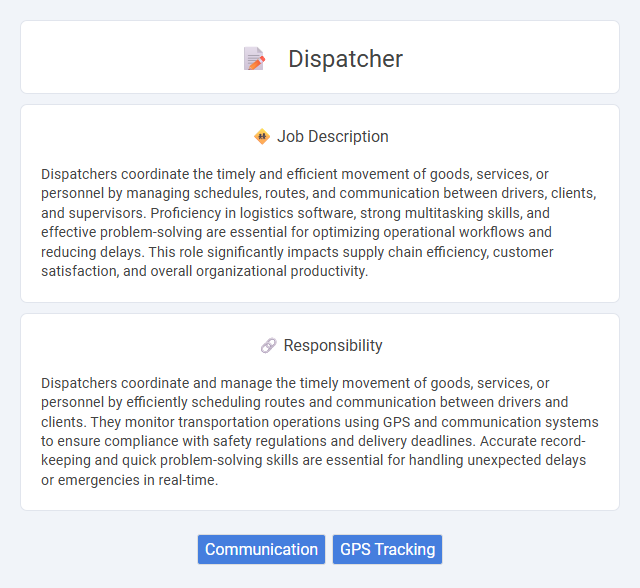
Dispatchers coordinate the timely and efficient movement of goods, services, or personnel by managing schedules, routes, and communication between drivers, clients, and supervisors. Proficiency in logistics software, strong multitasking skills, and effective problem-solving are essential for optimizing operational workflows and reducing delays. This role significantly impacts supply chain efficiency, customer satisfaction, and overall organizational productivity.
People who remain calm under pressure and possess strong communication skills are more likely suited for dispatcher roles. Individuals with the ability to multitask and think quickly in emergency situations have a higher probability of succeeding in this job. Those prone to stress or difficulty managing high-stakes scenarios may find the dispatcher position less compatible with their strengths.
Qualification
A Dispatcher must possess strong organizational and communication skills to efficiently coordinate schedules and manage resources. Proficiency in computer systems, GPS technology, and dispatch software is essential for tracking and routing vehicles or personnel. Relevant qualifications include a high school diploma or equivalent, with preferred experience in logistics, transportation, or emergency response.
Responsibility
Dispatchers coordinate and manage the timely movement of goods, services, or personnel by efficiently scheduling routes and communication between drivers and clients. They monitor transportation operations using GPS and communication systems to ensure compliance with safety regulations and delivery deadlines. Accurate record-keeping and quick problem-solving skills are essential for handling unexpected delays or emergencies in real-time.
Benefit
Working as a dispatcher likely offers the benefit of developing strong multitasking and communication skills, which can enhance career prospects. The role probably provides opportunities to work in diverse industries such as transportation, emergency services, and logistics, increasing job versatility. Competitive wages and potential for shift flexibility might make this position appealing to those seeking stable employment with work-life balance.
Challenge
Dispatcher jobs likely involve managing high-pressure situations that require quick decision-making and effective communication. The challenge often lies in coordinating multiple moving parts simultaneously to ensure timely responses and efficient logistics. Encountering unpredictable scenarios means adaptability and problem-solving skills are probably essential for success in this role.
Career Advancement
Dispatcher roles offer significant career advancement opportunities in logistics and transportation industries, with pathways leading to positions such as Operations Manager, Fleet Supervisor, or Supply Chain Coordinator. Gaining expertise in dispatch software, communication skills, and real-time problem solving enhances promotion prospects and salary growth. Professionals who continuously develop industry knowledge and leadership capabilities are highly sought after for senior management roles.
Key Terms
Communication
Effective communication is essential for a dispatcher to coordinate with drivers, clients, and emergency services, ensuring timely and accurate information flow. Dispatchers must relay clear instructions, updates, and changes while actively listening to address concerns and adapt plans. Mastery of communication technology and protocols optimizes response times and operational efficiency.
GPS Tracking
Dispatchers play a crucial role in coordinating the movement of vehicles, leveraging GPS tracking technology to monitor real-time locations and optimize routing efficiency. By analyzing GPS data, they ensure timely deliveries, reduce fuel consumption, and improve overall fleet management. Advanced GPS tracking systems enable dispatchers to respond swiftly to unexpected delays, enhancing customer satisfaction and operational productivity.
 kuljobs.com
kuljobs.com